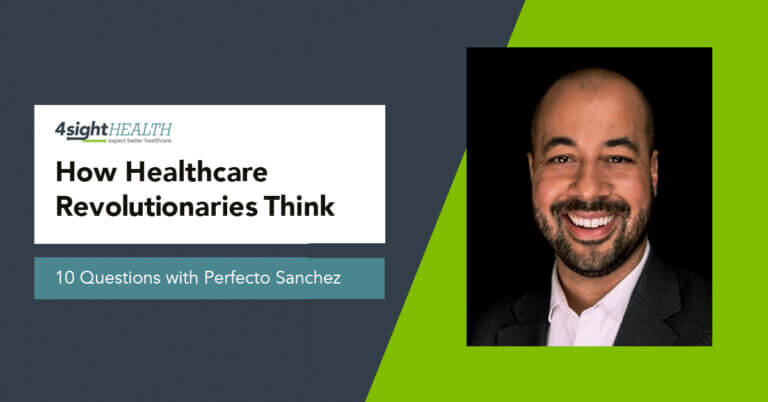January 30, 2024

Burda on Healthcare: What Do You Get When You Add Up All These Healthcare AI Surveys?
David W. Johnson, founder and CEO of 4sight Health, likes to say healthcare will change more in the next 10 years than it has over the past 100 years. And in our last 4sight Health Roundup podcast for 2023, Johnson said the near vertical liftoff of generative AI in just one year was the biggest healthcare trend of 2023. If you put the two thoughts together, AI-based technologies will power the accelerating and revolutionary changes in healthcare over the next decade.
That’s the big picture, policy perspective on AI and healthcare innovation. I have no reason to question Johnson’s perspective. I think he’s right.
But as a healthcare business reporter, I’m more of a small picture, economics kind of guy. My mantra, like most journalists, always has been follow the money.
I also like to follow the surveys. If everyone suddenly is conducting a survey about the same thing, that “thing” could be the story. Or, as one of my old journalism professors liked to say as he window-wipered his spindly finger across his nose, “Where there’s smoke, there’s fire.”
If surveys are the smoke, then healthcare AI is the fire. Below are just a handful of surveys on healthcare AI from different industry sectors, all of which want their economic piece of the pie from the accelerating and revolutionary changes that Johnson predicts. I limited my list to the surveys I saw during the fourth quarter of 2023.
Wary Consumers Say Generative AI Will Be Routine in Healthcare
 In December, Wolters Kluwer Health released a report, Generative AI in Healthcare: Gaining Consumer Trust. The report is based on a survey of a representative sample of 1,000 U.S. adults age 18 or older. Fifty-three percent of the respondents said they believe generative AI will be embedded in healthcare within the next five years. Sixty-three percent said they would switch physicians if they found out that they were using generative AI to help diagnose and treat them.
In December, Wolters Kluwer Health released a report, Generative AI in Healthcare: Gaining Consumer Trust. The report is based on a survey of a representative sample of 1,000 U.S. adults age 18 or older. Fifty-three percent of the respondents said they believe generative AI will be embedded in healthcare within the next five years. Sixty-three percent said they would switch physicians if they found out that they were using generative AI to help diagnose and treat them.
Administrative Burdens Before Diagnostic Ability for Physicians
In November, the American Medical Association released a report, Physician Sentiments Around the Use of AI in Healthcare: Motivations, Opportunities, Risks and Use Cases. The report is based on a survey of 1,081 practicing doctors. The survey pool was almost evenly split between self-described physician “tech adopters” and “tech averse” physicians, 49% to 51%, respectively. Sixty-five percent of the physicians said there was a “definite” or “some” advantage to using AI technology in their practices. But they were of two minds on where AI will be an advantage. When asked where AI will have the biggest impact, “diagnostic ability” topped the list, cited by 72% of the doctors. When asked where AI has the biggest opportunity to solve a practice need, “administrative burdens” topped the list, cited by 56% of the doctors.
Providers See Improved Operational Efficiency In Their Future
 In December, KLAS Research published a report, Generative AI 2023: What Are Organizations’ Current Adoption and Future Plans. The report is based on a survey of 66 healthcare executives from hospitals, ambulatory care clinics, home health and hospice services, and other provider organizations. Eighteen, or 27%, of the providers said they are using generative AI solutions in their organizations. Thirty-eight, or 58%, said it’s “highly likely” or “likely” that they will be buying or implementing a generative AI solution this year. Operational efficiency was the biggest opportunity for generative AI in healthcare, cited by 64% of the respondents.
In December, KLAS Research published a report, Generative AI 2023: What Are Organizations’ Current Adoption and Future Plans. The report is based on a survey of 66 healthcare executives from hospitals, ambulatory care clinics, home health and hospice services, and other provider organizations. Eighteen, or 27%, of the providers said they are using generative AI solutions in their organizations. Thirty-eight, or 58%, said it’s “highly likely” or “likely” that they will be buying or implementing a generative AI solution this year. Operational efficiency was the biggest opportunity for generative AI in healthcare, cited by 64% of the respondents.
Empowered Consumers Want to Level the Playing Field
 In November, the Deloitte Center for Health Solutions released a report, Can Generative AI Help Make Healthcare More Affordable? The report is based on a survey of a representative sample of 2,014 adults age 18 or older. Fifty-three percent of the respondents said generative AI has the potential to address access issues and reduce patient wait times. Forty-six percent said it could address affordability issues and lower individual healthcare costs. Eighty-four percent said they’ve heard of generative AI, and 48% said they already are using it. How? The top reason was to learn more about their medical conditions, cited by 19% of the respondents, followed by looking up their treatment options (16%), understanding medical and insurance terminology (15%) and supporting their health and wellbeing (15%).
In November, the Deloitte Center for Health Solutions released a report, Can Generative AI Help Make Healthcare More Affordable? The report is based on a survey of a representative sample of 2,014 adults age 18 or older. Fifty-three percent of the respondents said generative AI has the potential to address access issues and reduce patient wait times. Forty-six percent said it could address affordability issues and lower individual healthcare costs. Eighty-four percent said they’ve heard of generative AI, and 48% said they already are using it. How? The top reason was to learn more about their medical conditions, cited by 19% of the respondents, followed by looking up their treatment options (16%), understanding medical and insurance terminology (15%) and supporting their health and wellbeing (15%).
Making Healthcare Workforce Shortages a Thing of the Past
In November, Healthcare IT Leaders released a report, The State of Artificial Intelligence (AI) Adoption in Healthcare. The report is based on a survey of an undisclosed number of healthcare CIO and health IT leader members of CHIME (College of Healthcare Information Management Executives). Twenty-three percent of the respondents said they have AI pilots underway at their organizations with another 64% saying they plan to launch at least one AI pilot within the next two years. A noteworthy 57% of the respondents said AI will “significantly” or “moderately” alleviate healthcare workforce shortages.
Doctors Fear Growing Lack of Trust by Patients in Their Medical Expertise
In October, Medscape released a report, Physicians and AI Report 2023: A Source of Health or Concern? The report is based on a survey of 1,043 practicing physicians in more than 29 medical specialties. Forty-two percent said they were enthusiastic about the future of AI in their practices. Yet 65% said they were “very concerned” or “somewhat concerned” about AI driving a patient’s diagnosis or treatment decisions. Not surprisingly, performing office administrative tasks was the No. 1 way doctors said they would use AI in their practices, cited by 79% of the respondents. That was followed by staff scheduling (78%), patient scheduling (78%), EHRs (76%) and summarizing patients’ EHR before a visit (75%). But a telling 89% said they were “very concerned” or “somewhat concerned” that their self-diagnosing patients would take AI’s medical advice more seriously than the physician’s own medical expertise.
Move Over Cybersecurity and Interoperability
In October, Stoltenberg Consulting released its 11th Annual Health IT Industry Outlook report. The report is based on an undisclosed number of hospital and health system CIOs who also are members of CHIME. AI/machine learning claimed the No. 1 spot as the biggest topic in health IT in 2023, cited by 32% of the respondents. That was a five-fold jump in the percentage of respondents who said the same thing about AI/machine learning in 2022. Tied for a distant second: cybersecurity and interoperability, each cited by 16% of the respondents.
When you add up the sheer number of healthcare AI surveys being done by various healthcare industry sectors, it’s clear healthcare AI is the hottest healthcare topic around. Healthcare AI promises to disrupt or threaten, depending on your perspective, the way healthcare has worked for decades.
When you add up the survey results, they tell me that everyone is worried. They want healthcare AI to benefit them, not necessarily everyone else. They want it to make their medical decision-making better. They want it to make their operations more efficient. They want it to reduce their administrative burden. They want it to reduce their costs. They want it to increase their revenue.
Maybe that’s the greatest promise of generative AI in healthcare. It makes everybody equal. And if you believe that level-field competition and functioning markets benefit consumers like I do, welcome AI in healthcare with open arms.
Thanks for reading.





